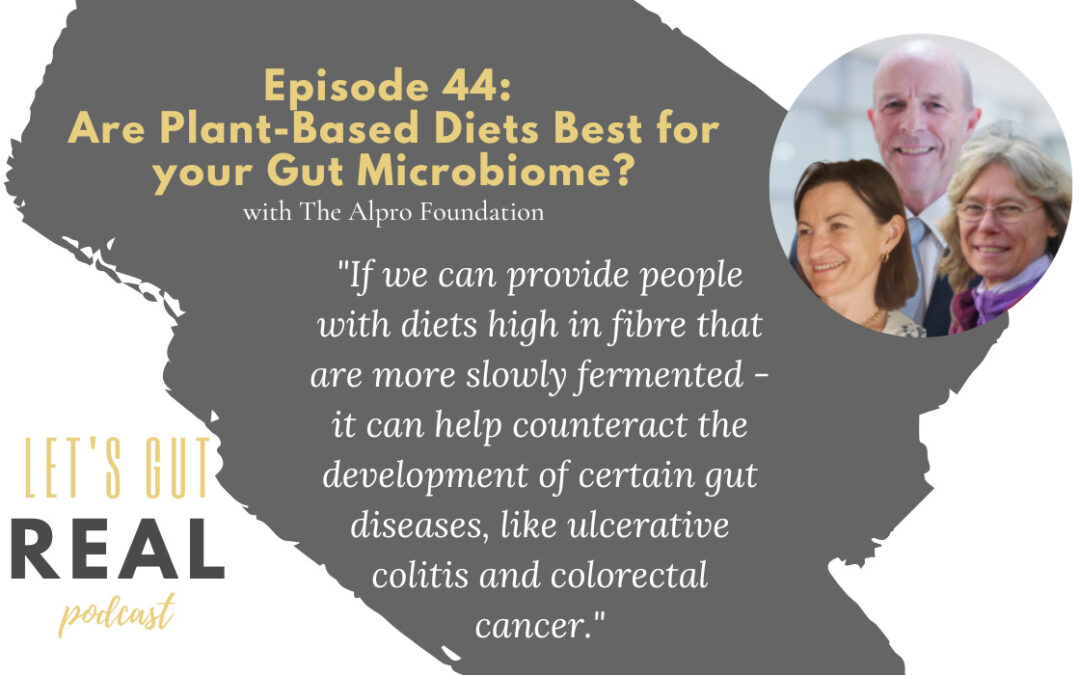With diets like keto and carnivore gaining traction, I’ve had so many people ask – what impact do plants specifically have on our microbiome and human health? This week I discuss how plants can have a big impact on the health of our gut microbiome!
Nutrition Pearls for Plant-Based Diets and Gut Microbiome Health:
- There is no definition about what a healthy gut microbiome is, but some species are more often associated with health markers
- There is a large variation between people for healthy gut microbiomes – Each person’s microbiome is almost like a fingerprint
- Diet is a key factor that determines the composition of the gut microbiome
- People with high fibre diets have a gut microbiome with a larger proportion of different bacteria as well as a larger overall amount of bacteria – considered markers of a more resilient microbiome
- It appears that overall nutrition quality and including plants in the diet is more important than whether a diet is completely animal-free or contains animal proteins.
- The fibre from whole foods likely has superior health promoting properties compared with fibre supplements
- If we can provide people with diets high in fibre that are more slowly fermented – it can help counteract the development of certain gut diseases, like ulcerative colitis and colorectal cancer.
- There is quite a bit of evidence that polyphenol intake (from fruits and vegetables) has benefits for cardiovascular disease, cancer and inflammatory diseases – possibly by way of exerting benefits through our gut microbiota
Currently, we have no definition of what a ‘healthy gut microbiome’ is, but we are finding that there are some characteristics that are associated with better health by way of the gut microbiome.
Today I interview Dr. Veronique Braesco, Dr. Petra Louis, and Dr. Ian Rowland, researchers that have contributed to the latest scientific update summarizing the impact of plant-based diets on the gut microbiome and published through the Alpro Foundation.
The Alpro Foundation has been a scientific platform for over 25 years dedicated to supporting research and the dissemination of evidence-based knowledge on plant-based nutrition and its impact on health and environment amongst academics, healthcare professionals and key stakeholders in nutrition. The ultimate aim is to help drive the transition to more healthful plant-based diets for human and planetary health.
Underpinning Alpro Foundation’s scientific integrity is an independent Scientific Advisory Board of 8 leading academic experts who provide direction and advice and ensure the scientific credibility of the education tools. Professor Ian Rowland is the chair of this Scientific Advisory Board.
Professor Ian Rowland is editor-in-chief of the European Journal of Nutrition. Until his recent retirement, he was the Hugh Sinclair Professor of Human Nutrition at University of Reading. He holds a BSc and PhD in microbiology from University College London. Prof. Rowland’s main research area is the role of diet (in particular probiotics, prebiotics, phytoestrogens, and phytochemicals) in the prevention of colon, breast and prostate cancer. In his current research, he is investigating the role of fruit and vegetable intake on markers of cancer risk. In 2005 he was awarded an honorary doctorate from the University of Gent in Belgium for his work on nutrition and cancer. Professor Rowland has published over 300 papers.
Petra Louis is a molecular microbiologist with an interest in the human gut microbiome, diet and health. She obtained her Diploma in Biology and PhD in Microbiology from the University of Bonn, Germany, where she conducted research on osmoadaptation in halophilic bacteria.
Véronique Braesco holds a PhD in human nutrition. Her academic carrier in Public Research at INRA, as senior scientist, has been focused on vitamins. She then headed the Nutrition Research Department of the Danone Group. In this position, she managed the design and implementation of scientific strategies, in particular in the field of probiotics. She was later responsible for the Human Nutrition Research Centre in Auvergne, dedicated to studying the role of diet in healthy aging. She is now at the head of VAB-nutrition, a consulting firm specialized in human nutrition that she created in 2007.
We talk about:
- What characteristics are associated with better health by way of the gut microbiome
- Beneficial and deleterious dietary components and their influence on gut microbiome
- Fibre from supplements versus food – is one ‘better’ for the gut microbiome?
- The role of the food matrix, the various chemical compounds found in food like polyphenols, and the role variety of fibres plays in the gut microbiome composition
- Polyphenols – where are they found, and what are potential ways in which they influence our health by way of the gut microbiome
- What are SCFA’s, what their role is in our health, and what influences the production of SCFAs in the gut
- Microbial metabolites from protein – when do we digest protein, how this occurs, how does it influence health?
- How fibre impacts microbial metabolite production in our bodies
- Dietary recommendations we can ultimately take away from the current evidence
The most recent Scientific update with the Alpro Foundation is about the ‘Interaction of Plant-based diets and gut microbiota’



Recent Comments